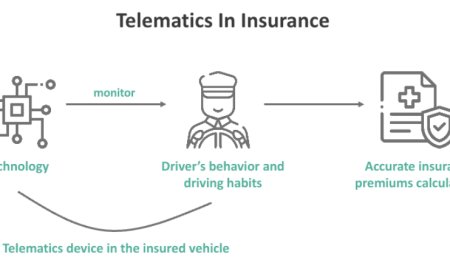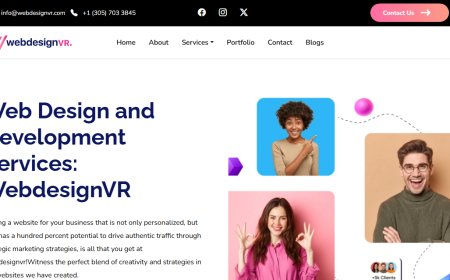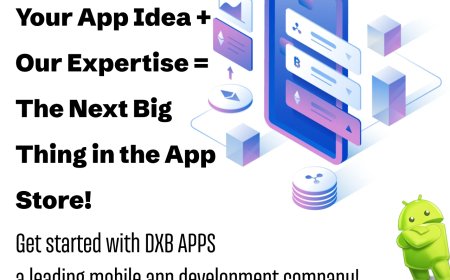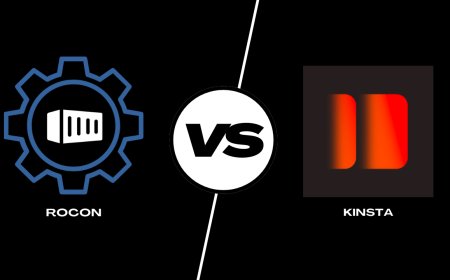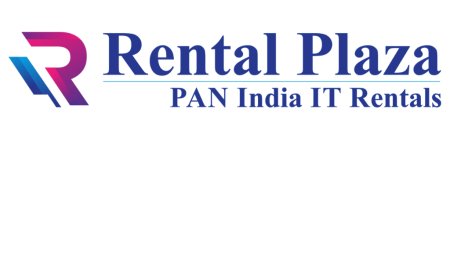Top Platforms to Hire Mobile App Developers in 2025
Mobile apps continue to be the lifeblood of digital innovation in 2025. From fintech and health apps to eCommerce and productivity tools, businesses large and small need reliable, skilled developers to bring their ideas to life. But here’s the challenge—the demand for top-tier mobile app developers has never been higher, and the market is saturated with platforms promising to connect you with the best.

Introduction
Mobile apps continue to be the lifeblood of digital innovation in 2025. From fintech and health apps to eCommerce and productivity tools, businesses large and small need reliable, skilled developers to bring their ideas to life. But heres the challengethe demand for top-tier mobile app developers has never been higher, and the market is saturated with platforms promising to connect you with the best.
Whether youre a startup founder building your MVP, a product manager scaling an existing app, or a business owner exploring new digital avenues, selecting the right hiring platform can make or break your success. The right developer can speed up your go-to-market, reduce costs, and enhance user experience. The wrong one? Delays, budget overruns, and technical debt.
In this guide, we break down the top platforms to hire mobile app developers in 2025, comparing them by type, vetting process, costs, and project needs. Youll also learn how to match your hiring goals with the best platform typefreelance, full-time, or agencyso you hire smarter and faster.
Identify Your Project Requirements
Native vs. Cross-Platform Development
Before choosing a platform, you need to know what type of developer youre looking for. Mobile app development generally falls into two categories:
- Native Developers: Specialize in building apps specifically for iOS (Swift/Objective-C) or Android (Kotlin/Java). Ideal for high-performance, feature-rich apps.
- Cross-Platform Developers: Use frameworks like Flutter, React Native, or Xamarin to build one app that works on both platforms. Great for startups or MVPs needing speed and cost efficiency.
Each approach requires different technical skill sets. Choosing the wrong type can waste time and money, so define your apps core requirements first.
Freelance, Full-Time, or Agency: What Do You Need?
- Freelancers: Best for small or one-off projects, MVP builds, or budget-limited startups. They offer flexibility but require strong project management.
- Full-Time Developers: Ideal for ongoing work, larger product teams, or when you want long-term scalability and stability.
- Agencies: Provide end-to-end solutions including design, development, testing, and project management. Ideal for non-technical founders or complex builds.
Once youve nailed down your needs, you can match them with the most suitable hiring platform category.
Key Criteria to Evaluate Hiring Platforms
Talent Quality and Vetting Processes
Not all platforms are equal when it comes to developer quality. Some, like Toptal and Gun.io, rigorously vet their talent with interviews and coding tests. Others, like Fiverr or Freelancer, rely on self-reported experience and reviews, which means you need to vet the talent yourself.
Questions to ask:
- Does the platform vet developers before listing?
- Are there skill tests or technical interviews involved?
- Do you get a dedicated account manager or success rep?
Vetting is the first step in risk management when hiring online.
Cost and Pricing Models
Platforms vary in pricing models:
- Hourly rate-based (e.g., Upwork, Toptal)
- Project-based (e.g., Fiverr, agencies)
- Salary/recruitment fee-based (e.g., Arc, AngelList)
Make sure the platforms pricing aligns with your budget. Some platforms take a commission on top of developer rates, so factor that in when comparing costs.
Communication and Project Management Tools
Platforms with built-in messaging, time tracking, or even project management boards (like Upwork or YouTeam) make collaboration easier. Especially when working with offshore or part-time talent, streamlined communication and milestone tracking are essential.
Look for platforms that support:
- Secure file sharing
- In-app messaging
- Payment protection or escrow
- Time logging (if hourly)
Smooth communication leads to fewer misunderstandings and better results.
Top Freelance Platforms for Mobile App Developers
Upwork
Overview: Upwork is one of the largest freelance platforms in the world, with thousands of mobile app developers specializing in iOS, Android, and cross-platform solutions.
Pros:
- Wide range of talent levels and price points
- Escrow protection and milestone tracking
- Built-in messaging, contracts, and reviews
Cons:
- High competition means some low-quality applications
- 1020% service fee on payments
Best For: Startups and SMEs needing affordable, flexible development help.
Freelancer.com
Overview: Similar to Upwork but slightly more global, Freelancer offers mobile app developers for both hourly and fixed-price contracts.
Pros:
- Competitive pricing
- Good for quick, one-time projects
- User-friendly interface
Cons:
- Less stringent vetting
- Can attract spammy bids
Best For: Cost-conscious businesses that have experience managing remote teams.
Fiverr Pro
Overview: Fiverr Pro offers a curated selection of high-quality freelancers with pre-defined service packages. Great for fast, predictable tasks.
Pros:
- Pre-built app services with clear scope
- Fiverr Pro freelancers are vetted
- Transparent pricing
Cons:
- Not ideal for complex, long-term projects
- Limited flexibility beyond packages
Best For: Startups looking for prototypes, UI work, or simple app functionality.
PeoplePerHour
Overview: UK-based freelance marketplace offering hourly and project-based mobile app development services.
Pros:
- Strong European developer base
- Pay-as-you-go model
- Easy project creation and vetting
Cons:
- Smaller talent pool compared to Upwork
- Fewer advanced specialists
Best For: Small businesses in Europe seeking quick turnarounds or low-risk engagements.
Premium Platforms with Vetted Developers
Toptal
Overview: Toptal (short for Top Talent) is renowned for providing access to the top 3% of freelance developers worldwide. Every developer is thoroughly vetted through a multi-stage screening process, ensuring only the most elite talent is cut.
Pros:
- Highly vetted and experienced developers
- Excellent client support and personalized matching
- Risk-free trial period for new hires
Cons:
- Higher cost than most platforms
- Better suited for companies with flexible budgets
Best For: Businesses that prioritize quality over cost, especially for mission-critical or complex app projects.
Gun.io
Overview: Gun.io is a developer-first hiring platform that connects companies with elite software engineers in the U.S. market. Their talent pool is heavily vetted and often includes developers who have worked with Fortune 500 companies.
Pros:
- Strong vetting process
- Fast matching (often within 48 hours)
- Transparent pricing
Cons:
- Limited to U.S.-based developers
- Higher hourly rates
Best For: U.S. startups or businesses that require strong communication and timezone alignment without compromising on skill.
Lemon.io
Overview: Lemon.io matches startups with Eastern European freelance developers. Their focus is on affordable, vetted talent with excellent work ethics and communication skills.
Pros:
- Thorough vetting and personality assessment
- Lower cost compared to the U.S./Western Europe
- Quick onboarding and developer replacement guarantees
Cons:
- Smaller talent pool than global platforms
- Limited to non-European time zones
Best For: Startups on a budget that still need reliable, skilled developers for MVPs or app enhancements.
Arc.dev
Overview: Arc.dev (formerly CodementorX) connects companies with top-tier remote developers from around the globe. It offers both freelance and full-time hiring solutions.
Pros:
- High-quality global developer network
- Part-time, full-time, and hourly engagement options
- Technical interview support
Cons:
- Less suited for quick or one-off projects
- Service fees apply
Best For: Companies looking for vetted remote talent with flexible engagement terms.
Platforms for Hiring Full-Time or Part-Time Developers
Overview: LinkedIn remains one of the most powerful platforms for hiring professional talent across industries. With advanced filters and recruiter tools, you can source developers based on experience, location, tech stack, and more.
Pros:
- Huge global talent pool
- Advanced search and InMail tools
- Direct outreach to passive candidates
Cons:
- No built-in project tools or payment handling
- Can be time-consuming without a dedicated recruiter
Best For: Companies with a strong HR team or startups looking for long-term, in-house developers.
AngelList Talent (Wellfound)
Overview: AngelList (now Wellfound) is a startup-centric hiring platform perfect for finding mobile developers who are excited to work in early-stage environments.
Pros:
- Many candidates are open to equity-based compensation
- Great for a startup hiring culture
- Free to post jobs for most startups
Cons:
- Competitivemany startups are hiring from the same pool
- Less structured vetting
Best For: Startups looking for passionate, entrepreneurial-minded developers.
Remote OK
Overview: Remote OK is a job board for remote tech talent. It attracts freelance and full-time developers who specialize in mobile and web apps and are actively seeking remote opportunities.
Pros:
- Affordable job posting
- Global reach
- High-quality applicants for remote roles
Cons:
- Limited applicant filtering tools
- No vetting or screening system
Best For: Remote-first companies that are comfortable handling their hiring process.
We Work Remotely
Overview: One of the largest job boards for remote professionals, We Work Remotely is a great place to find full-time mobile developers interested in flexible, distributed teams.
Pros:
- Highly targeted at remote workers
- Trusted by companies like Basecamp and Shopify
- Straightforward posting process
Cons:
- No in-platform vetting or matching
- Requires manual filtering and outreach
Best For: Companies that want access to self-motivated, experienced remote developers.
Developer-Focused Communities and Niche Platforms
Stack Overflow Talent
Overview: As one of the most trusted platforms in the developer community, Stack Overflow attracts highly skilled professionals who participate in coding discussions, share knowledge, and solve technical problems.
Pros:
- Access to engaged, technically strong developers
- Candidate matching based on activity and expertise
- Excellent brand exposure for hiring companies
Cons:
- More expensive than general job boards
- Better for sourcing than short-term gigs
Best For: Companies with technical hiring teams who want to engage experienced developers actively contributing to the dev community.
GitHub Jobs (Now Sunset, Replaced by Third-Party Tools)
Overview: Although GitHub Jobs officially shut down in 2021, GitHub is still an excellent place to find and vet developers through repositories, contributions, and public profiles.
Pros:
- Evaluate real code and open-source contributions
- See developer history, stars, forks, and activity
- Direct outreach via GitHub or linked profiles
Cons:
- No centralized hiring tool
- Requires manual vetting and outreach
Best For: Tech-savvy founders or CTOs who prefer scouting candidates by reviewing real work.
Indie Hackers
Overview: Indie Hackers is a community of bootstrapped entrepreneurs, developers, and builders. Many mobile app developers here are working on side projects and are open to collaborations.
Pros:
- High engagement in startup culture
- Great place for partnership or co-founder roles
- Excellent community-driven conversations
Cons:
- Not a structured hiring platform
- It may attract more hobbyists than full-time professionals
Best For: Early-stage startups and founders looking for like-minded developers or partners.
Reddit and Discord Channels
Overview: Reddit subreddits like r/forhire, r/androiddev, and r/iOSProgramming, as well as niche Discord developer communities, are surprisingly rich hiring grounds.
Pros:
- Active and niche-focused communities
- Real-time communication (Discord)
- Free to use
Cons:
- No vetting or payment protection
- Requires moderation and caution
Best For: Founders who want grassroots outreach and are comfortable manually managing the process.
Offshore and Outsourcing Marketplaces
Turing
Overview: Turing connects companies with a global network of pre-vetted software developers, specializing in remote-first hiring. Their AI-powered platform matches developers based on skill, timezone compatibility, and project requirements.
Pros:
- Thorough vetting process (including algorithmic screening and interviews)
- Timezone-aligned developers from around the world
- Dedicated customer success support
Cons:
- Higher rates than traditional offshore services
- Minimum engagement periods may apply
Best For: Companies looking for long-term offshore developers with strong communication and deep technical expertise.
Andela
Overview: Originally focused on Africa, Andela has expanded globally, providing vetted developers across multiple regions. They focus on placing full-time, long-term talent in U.S. and European companies.
Pros:
- Rigorous selection process
- Focus on senior-level developers
- Transparent billing
Cons:
- Premium pricing
- Not ideal for short-term or low-budget projects
Best For: Enterprises or startups seeking diversity and long-term offshore team members.
YouTeam
Overview: YouTeam is a marketplace that connects businesses with development agencies and vetted engineers from Eastern Europe and Latin America. It offers transparency in pricing and team availability.
Pros:
- Rapid team scaling and deployment
- Vetted agencies with proven portfolios
- Transparent pricing and contracts
Cons:
- It may be overkill for solo developer needs
- Limited flexibility on part-time engagements
Best For: Mid-sized businesses or startups that need to scale quickly with reliable offshore teams.
Supersourcing
Overview: Supersourcing is a managed outsourcing platform that matches companies with vetted agencies for full-cycle product development. It ensures quality through structured contracts and milestone-based billing.
Pros:
- Managed process with PM support
- Pre-vetted agencies and developers
- Built-in contracts, compliance, and payments
Cons:
- Less control over individual developer selection
- Slightly longer onboarding time
Best For: Non-technical founders who need a managed solution with minimal risk.
Specialized Agencies and Tech Marketplaces
Gigster
Overview: Gigster is a full-service development agency offering software solutions powered by elite developers, product managers, and designers. It's perfect for enterprise and venture-backed startups needing scalable, done-for-you builds.
Pros:
- High-end service and professionalism
- Full development lifecycle support
- Access to a vetted pool of global experts
Cons:
- Premium pricing
- Less flexibility on ad hoc or minor changes
Best For: Companies needing enterprise-level quality with project management included.
Appetiser
Overview: Appetiser is an Australian-based agency focused on building innovative, UI/UX-rich mobile apps. Known for partnering with fast-growing startups and creating investor-ready MVPs.
Pros:
- Focus on ROI and startup success
- Strong design and branding integration
- Transparent process and timeline
Cons:
- Primarily serves the Australian and U.S. markets
- High demand may lead to scheduling delays
Best For: Startups seeking MVPs that impress investors and users.
BairesDev
Overview: Based in Latin America, BairesDev is one of the largest nearshore development firms. They provide engineering teams to U.S. companies and boast a broad talent pool.
Pros:
- Large-scale scalability
- Timezone alignment with U.S. clients
- Mature infrastructure and support systems
Cons:
- Enterprise-oriented pricing and structure
- May not fit solo entrepreneurs or micro-startups
Best For: Enterprises and large startups looking for reliable, long-term tech partnerships.
MindInventory
Overview: MindInventory is a mobile app development agency offering iOS, Android, and cross-platform solutions, with a strong focus on UI/UX and business logic.
Pros:
- Competitive pricing for offshore development
- Strong design capabilities
- Offers dedicated team models or fixed-cost projects
Cons:
- Limited cultural overlap with Western clients
- Requires detailed project planning upfront
Best For: Cost-sensitive startups looking for complete mobile development packages.
Factors to Consider When Choosing a Platform
With so many platforms available, choosing the right one depends on several factors:
- Budget: Can you afford a premium, vetted platform like Toptal, or do you need something more budget-friendly like Upwork or Fiverr?
- Project Complexity: Is this a simple MVP or a feature-rich enterprise application?
- Timeline: Do you need someone to start immediately, or can you wait for the perfect match?
- Vetting Requirements: Do you need pre-screened candidates, or are you comfortable doing your vetting?
- Support & Tools: Do you prefer platforms that offer project management, contracts, and payment handling?
- Engagement Type: Are you looking for freelance, part-time, full-time, or agency services?
Make a checklist and compare platforms based on what matters most to your project.
Common Mistakes to Avoid in the Hiring Process
- Ignoring cultural fit: Developers need to align with your companys communication style, work culture, and values.
- Choosing based on price alone: Low rates often lead to low-quality code and missed deadlines.
- Skipping the trial project: Always assign a small paid task to test real-world capabilities.
- Being unclear on project scope: Vague goals lead to scope creep and confusion.
- Micromanaging or under-managing: Provide direction, but also trust your developers expertise.
Avoid these traps to save time, money, and stressand to build better products faster.
Conclusion
In 2025, the platforms you use to hire mobile app developers can make all the difference. From flexible freelance networks to premium vetted marketplaces and full-service agencies, theres a solution for every budget, timeline, and technical challenge.
The key is knowing your project needs and choosing a platform that aligns with your goals. Whether you're building an MVP, scaling an existing app, or seeking enterprise-grade solutions, the hiring ecosystem has never been more diverse or accessible.
Take your time, do your research, and use trial projects to test the waters. The right developer is out thereon the right platformready to turn your app idea into reality.
FAQs
What is the best platform for hiring mobile app developers in 2025?
It depends on your needs. Upwork is great for flexible hiring, Toptal for elite vetted talent, and Gigster for full-service solutions. Startups may prefer Wellfound, while agencies like Appetiser cater to design-focused apps.
How much does it cost to hire a mobile app developer?
Hourly rates range from $25$150+, depending on location, experience, and platform. Freelancers cost less but require oversight. Agencies or vetted developers charge more but often deliver faster with higher quality.
Should I use a freelancer platform or a vetted talent network?
Use a freelancer platform (e.g., Upwork, Fiverr) for short-term tasks or MVPs. Use a vetted network (e.g., Toptal, Gun.io) for long-term, mission-critical projects where reliability and skill are non-negotiable.
Are agency-based platforms better for complex projects?
Yes. Agencies offer full teams (developers, designers, PMs) and manage the project end-to-end. Theyre ideal for founders without technical backgrounds or teams lacking internal resources.
How do I ensure a developer is a good cultural fit?
Conduct video interviews, ask behavioral questions, and test real-world collaboration during trial tasks. Look for communication skills, adaptability, and shared valuestechnical skills alone arent enough.





















